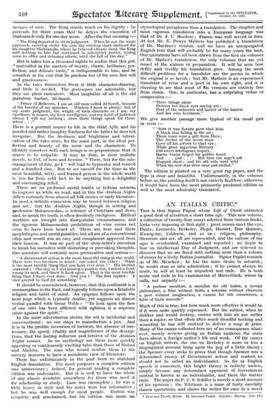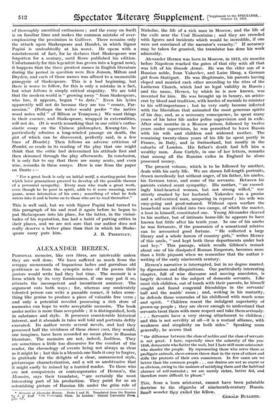AN ITALIAN CRITIC.*
Tins is that Signor Papini whose Life of Christ attracted a good deal of attention a short time ago. This new volume, a collection of twenty-four essays selected from various books, looks very imposing at first sight ; great names meet the eye, Dante, Leonardo, Berkeley, Hegel, Hamlet, Don Quixote, Kwang-tze, Calderon, and so on ; religion, philosophy, literature and art, all are represented, and the culture of the ages is overhauled, examined and reported ; we begin to fear an intellectual Day of Judgment, and are relieved to discover that we are faced with nothing more than a volume of essays by a lively Italian journalist. Signor Papini reminds us of Mr. Mencken ; he has the same desire to astonish ; he would stun us into admiration ; if he cannot always be acute, he will at least be impudent and rude. He is both acute and rude in his examination of Maeterlinck, whom he calls, not unjustly :— " A parlour occultist, a moralist for old ladies, a syrup3. philosopher, a friar without faith, a scientist without clearness, a poet without imagination, a casuist for idle consciences, a fakir of facile marvels."
Much of this is true, but how much more effective it would be if it were mote quietly expressed. But the author, when he dislikes and would destroy, carries with him an axe rather than a rapier, so that often after much dreadful hacking and wounding he has still omitted to deliver a coup de grdce. Many of the essays collected here are of no consequence what- ever, merely reviews giving an Italian audience the main facts about a foreign author's life and work. Of the essays on English writers, the one on Berkeley is more or less a biographical account hung upon the peg of a little theory ; the Spencer essay seeks to prove that though Spencer was a determined enemy of Government action and control, he should not be called an individualist. So far as English speech is concerned, this bright theory is entirely useless, simply because any determined opponent of Government control is known as an individualist, and there the matter ends. The paper on F. C. S. Schiller is merely a short account of his opinions ; the Whitman is a mass of fairly carefully chosen quotations, and shows the writer for once in a mood • Four and Twenty Minds, By Giovanni Pepin'. London : Hump. [10s. 6d.] of thoroughly uncritical enthusiasm ; and the essay on Swift is on familiar lines and makes the common mistake of over- emphasizing the pessimism in Gulliver. There remains only the attack upon Shakespeare and Hamlet, in which Signor Papini is undoubtedly at his worst. He opens with a misstatement of fact, for he declares that Shakespeare was forgotten for a century, until Rowe published his edition. Unfortunately for this legend (it has grown into a legend now), it happens that the three greatest names in English literature during the period in question were Ben Jonson, Milton and Dryden, and each of those names was affixed to a memorable panegyric of Shakespeare. This is a bad beginning, but there is worse to follow, for this is only a mistake in a fact, but what follows is simply critical stupidity. We are told that the modern world is "growing away" from Shakespeare, who has, it appears, begun " to date." Even his lyrics apparently will not do because they are too "ornate, Par- nassian." (Perhaps the writer would prefer "the native wood notes wild" of Milton or Tennyson.) We want things in their essence, and Shakespeare, wrapped in externalities, will not do. (It is worth remarking that in our critic's enthu- siastic essay on the Chinese philosopher, Kwang-tze, he particularly admires a long-winded passage on death, the gist of which can be discovered, perfectly said, in a few lines of Hamlet.) Then follows an adverse criticism of Hamlet, so crude in its reading of the play that one might
think that the critic had determined his attitude first and then skimmed through the play afterwards. In conclusion, it is only fair to say that there are many acute, and even wise, remarks in these essays. Here is one from the paper on Dante :—
" For a great book is only an initial motif, a starting-point from Lich later generations proceed to develop all the possible themes of a perennial sympathy. Every man who reads a great work, even though he be poor in spirit, adds to it some meaning, some pause, some intonation of his own ; something of what he feels enters into it and is borne on to those who are to read thereafter."
This is well said, but we wish Signor Papini had turned to this paragraph of his and read it again before he began to put Shckespeare into his place, for the latter, in the vicissi- tudes of his reputation, has had a habit of putting critics in their places, and we are not sure that our author does not really deserve a better place than that in which his Shake-
Teare essay puts him.
J. B. PRIESTLEY.



























































 Previous page
Previous page